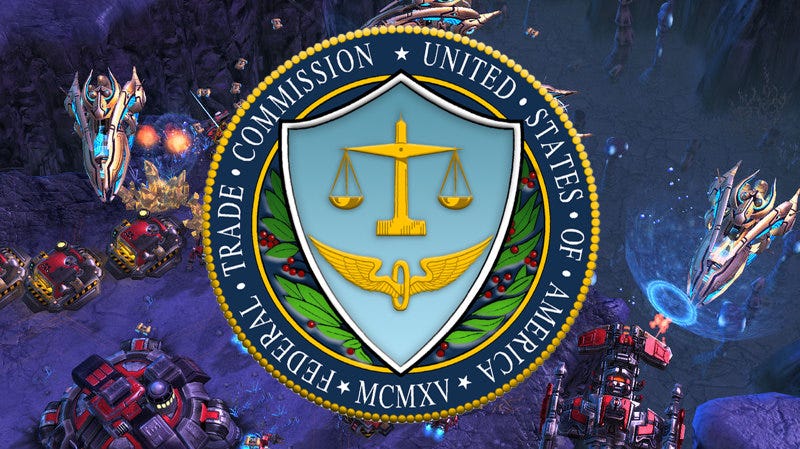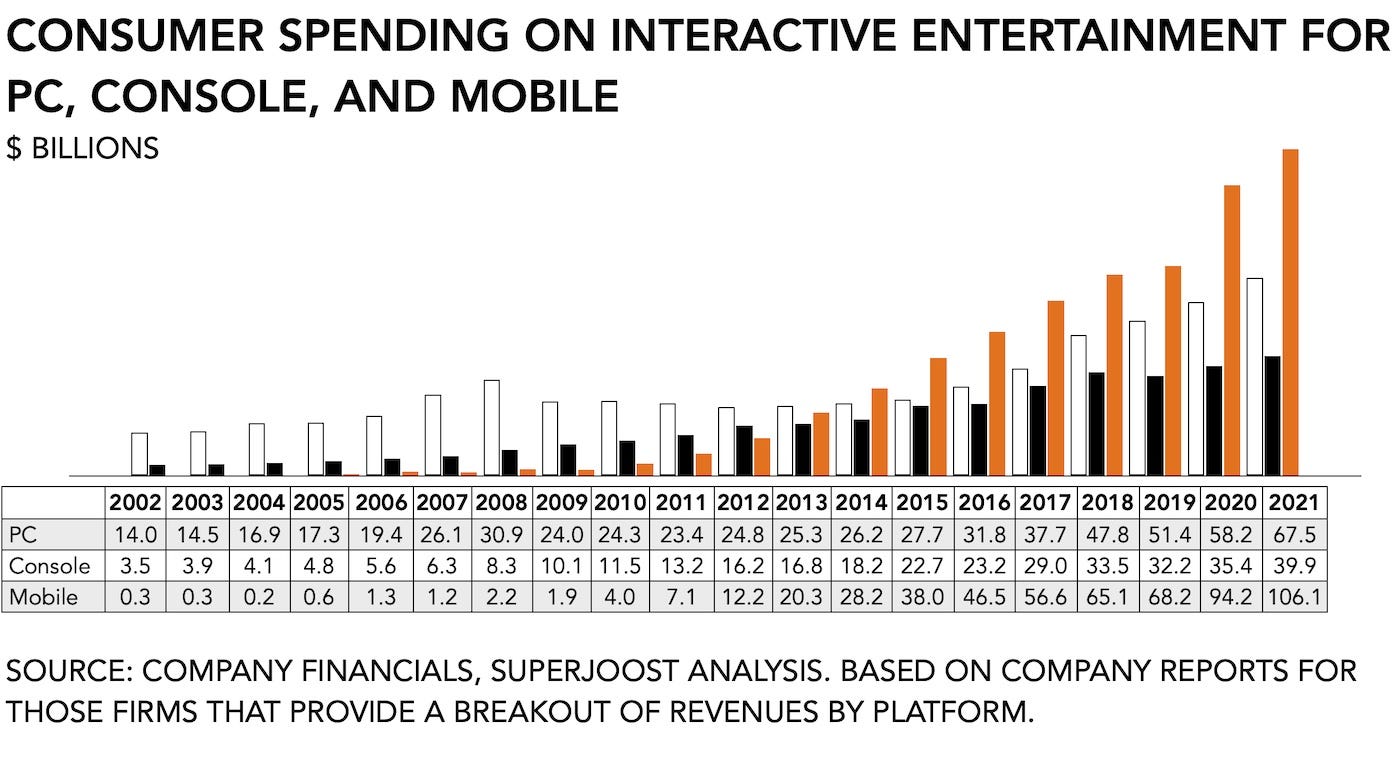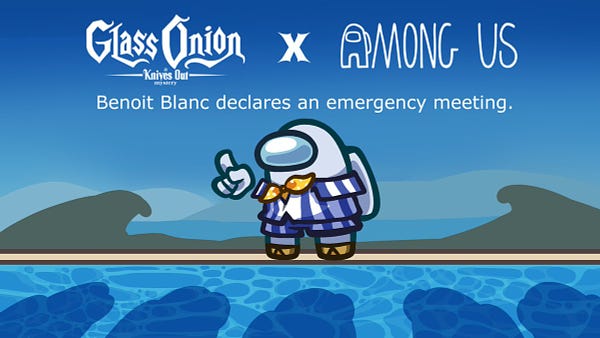Will Microsoft actually close the Activision deal?
Publikováno: 12.12.2022
We're going to say... yes. Also, Tim Sweeney & lots of discovery news!
[The GameDiscoverCo game discovery newsletter is written by ‘how people find your game’ expert & company founder Simon Carless, and is a regular look at how people discover and buy video games in the 2020s.]
We’re getting there, kind GameDiscoverCo readers. It’s nearly the end of the year, when we can all relax and enjoy a little eggnog while playing Tetris*, or whatever the heck your ‘relaxing time of year’ looks like. (*Fine, we’ll settle for Puyo-Puyo.)
Talking of which, here’s GameDiscoverCo’s holiday 2022 newsletter schedule: we’ll be running a newsletter this Wed 14th, and then there’ll be one (free) newsletter per week the week of December 20th and 27th - including a specially themed issue - to finish up the year. Then we’re back full force for free/Plus newsletters in W1 2023!
[BTW - for Holiday 2022, we have a 25% off deal through EOY for our GameDiscoverCo Plus paid subscription. This includes a regular PC/console game trend analysis newsletter, a big Steam ‘Hype’ & performance chart back-end, eBooks, a member-only Discord & more.]
Microsoft x Activision: can the FTC really block it?

So, this Microsoft/Activision deal. It’s a little thing - not sure if you’ve heard of it? Well, we cursed when the U.S. Federal Trade Commission - under chairperson Lina Khan - revealed they would seek to block the deal last Thursday.
To be clear, we only cursed because we feared this newsletter wouldn’t be timely enough. But in fact, the wait has allowed us to take in all kinds of perspectives, and has led to a much better round-up of the situation, which starts.. now:
First, you can look at the FTC’s complaint [.PDF], with some redactions, which says that the deal “is reasonably likely to substantially lessen competition and/or tend to create a monopoly in both well-developed and new, burgeoning markets, including high performance consoles, multi-game content library subscription services, and cloud gaming subscription services.”
The Washington Post has a good explainer on the situation, including a big, important note: “Thursday’s announcement means the FTC plans to file a lawsuit to block Microsoft’s acquisition of Activision. It does not mean the FTC has already blocked it. The suit will go before a judge, who could decide that the FTC’s case against Microsoft isn’t sufficiently strong to actually block the deal.”
It’s generally agreed that FTC chair Lina Khan, who wrote a key law school essay that said “current American antitrust law framework… cannot account for the anticompetitive effects of platform-based business models such as that of Amazon”, is looking to ‘push the envelope’ of blockable deals. (Arguably, the FTC’s legal complaint against Meta for acquiring fitness app firm Within is even more aggressive still.)
We found two interesting opposing views on the FTC complaint: Matt Stoller, who writes on ‘the politics of monopoly power’, is obviously a fan of the FTC’s approach, saying: “the reason Microsoft can afford to get into gaming is precisely because it was the original big tech monopolist, and while it was pushed back by a series of antitrust suits in the late 1990s, it never faced real competition in its main lines of business.” He sees the ‘be nice’ strategy as just that - a tactic.
And this isn’t just all about Xbox vs. PlayStation, btw. One fascinating document Stoller found: “In a rather astonishing argument, [Microsoft antitrust consultant Fiona Scott Morton] claimed Microsoft, if it can complete the acquisition, will have the ability to lobby its way into opening up the mobile sector.” His view on that: “Basically, Microsoft can out-corrupt the corrupt monopolists.”
On the other hand, FOSS Patents’ Florian Mueller is practically foaming at the mouth about how unjustified this is, calling it “politically motivated & legally meritless” in his headline, and noting, intriguingly: “Maybe the FTC wants to make a statement and hopes that after losing this case it will be in a better position to push (alongside the DOJ) for new merger laws.” (He also has some follow-up posts.)
So, lots of opinions here. And of course, if the UK or European Union decide to block the deal more concretely - which is still possible - then we won’t find out the end result of the FTC action. But if it’s down to the FTC vs. Microsoft only, I tend to believe that Microsoft will prevail in court, and the transaction will close.
Why? Because with the possible exception of Call Of Duty, which Microsoft is hotstepping to deal with and makes decent arguments on, no single part of the Activision Blizzard deal makes Microsoft a dominant platform holder. It just doesn’t.
Of course, Microsoft is in danger of becoming dominant in some of the areas that the FTC suit mentions. But that’s because other platforms like Nintendo and Steam have chosen not to compete with them in areas like ‘multi-game content library subscription services’. Seems like… a business decision? (Albeit backed by hella Windows $.)
And ultimately, Lina Khan’s FTC is making a statement about ‘big tech’ intended to probe the boundaries of what can be blocked. Change happens as a result of even doing this. Oh - Microsoft is now (allegedly) telling Sony that it can have Call Of Duty in PlayStation Plus. Whether this shakedown is fair, or good? Above my pay grade.
Wot Tim Sweeney thinks re: platform monopolies!
One of the websites we link to the most in the GameDiscoverCo newsletter is The Verge. Its inquisitive video game coverage is great, and as interested in ‘platform issues’ as specific games.
So we were delighted to see that the site’s Alex Heath had interviewed Epic Games CEO Tim Sweeney about ‘the stuff he Tweets about a lot’. And Sweeney said some things that were pretty interesting on the smartphone duopoly:
He’s really not buying Apple’s ‘we need to run the only iOS App Store for platform safety’ argument: “We know from the Epic v. Apple trial that Apple reviewers spend an average of six minutes of human time looking at each app and that these are app enthusiasts who are not engineers or security analyst analysts… it’s incredibly clear that app review and the monopoly App Store do nothing to improve platform security.”
But what does he want? “Epic would settle for, and only for, unfettered ability of developers - it’s not just Epic but all the developers - to compete in the app distribution market. And freedom of developers and consumers to engage in direct distribution, where consumers can download apps from the developer’s website, and the unfettered competition in payments for in-app purchases.”
Sweeney says that on mobile, users are "in no position to vote with their dollars” because: “One hundred percent of all smartphone users that are… outside of China are either governed by Google, which is Android’s terms of service, or Apple’s terms of service… they have some superficial policy differences but they are both doing the same illegal things in the same general illegal ways.”
You might be, like - ‘Tim, you can have other stores on Android phones, man’. His view on this is also clear: “While [Google] don’t block all competing stores entirely, they disadvantage them so extensively that we don’t think that we have an opportunity to compete on Android fairly, either..”
Listen - you have to respect Tim Sweeney’s strong ideological views. He’s incredibly passionate about pursuing them, sometimes to the financial detriment of the company he runs. (And BTW, he mentions he does see Windows and Mac as open platforms.)
In addition, if you feel like the above is a bit of a rehash of points made during the Epic vs. Apple trial, there were a couple of new (to me!) elements in the interview:
Sweeney alleges that in the first half of 2021, after seeing Valve’s Steam app for iOS and Sony’s PlayStation app, in which you can buy games for Steam and PlayStation, “Epic Games built the Epic Games Store app for iOS as a PC game store [where you can buy] PC game apps”, and Apple rejected it “based on their unilateral ability to decide what apps are allowed on iOS and without reference to any actual App Store rules.” (His view.)
He makes a particularly interesting comment on AR: “I think that augmented reality is the platform of the future. But it’s very clear from the efforts of Magic Leap and others that we need not just new technology but, to some extent, new science in order to build an augmented reality platform that’s a substitute for smartphones. And it’s not clear to me whether that’s coming in 10 years or in 30 years. I hope we’ll see it in my lifetime, but I’m actually not sure about that.”
The game discovery news round-up..

OK, what interesting new facts (and opinions) about game discovery and platforms have become available since our last free newsletter? We found these gems:
You are probably up to date on The Game Awards? Here’s a round-up of all the big announcements if not. For us re: platform strategy, Sony confirming Returnal and The Last Of Us Part 1 are coming to PC in 2023 - with PSN logins in tow, no doubt - was the most relevant? (Oh, and Google Play on PC sponsored some ads during the show.)
Riot has now launched (and detailed!) its Game Pass deal with Microsoft across multiple PC and mobile games (League Of Legends, Valorant, etc!) And it’s a clever integration for Game Pass retention. GP-specific perks are marked with an icon, and: “If your Game Pass membership expires, your in-game benefits will be lost.”
Always interesting to see PlayStation’s official top-selling games in November for PS4 and PS5 native apps. Of course, Call of Duty and God Of War are atop the charts, but there’s also a free-to-play chart with Call of Duty: Warzone 2.0 and Overwatch 2 outdownloading Fortnite. (And the newly free Sims 4 doing great!)
Partly platform, partly a technical thing: the upcoming Forbidden West DLC is PS5-only, interestingly. (Contrast this to Microsoft’s more open approach with the also ‘technically high-end’ Flight Simulator, which just hit 10 million players & allows lower-spec Game Pass hardware to play via cloud on their Xboxes.)
Microlinks: if you have an Amazon Prime subscription, you can play purchased Ubisoft Store games on Luna at no added cost; how Fortnite’s Unreal facelift shows off the engine to its fullest; an interview with Jaz Rignall explaining how the veteran works with VGM to do in-person player testing for PC/console games. (Not a plug - found it interesting cos you don’t see the process explained often.)
NPD’s Nov. 2022 U.S. hardware and (select) software reveal moved off Twitter onto Mat Piscatella’s LinkedIn page & the web, and: “A surge in PlayStation 5 hardware supply combined with strong sales of new games such as Call of Duty [MW2]… God of War: Ragnarök, Pokémon Scarlet/Violet and Sonic Frontiers helped the U.S. video game industry reach 3% dollar sales growth in November compared to a year ago.”
How many players on Steam have crafted those special badges that happen during big sales and Next Fests? SteamDB has a page up featuring estimates now. For example, 5.1 million people completed the ‘review a game and then nominate it’ for the 2022 Steam Awards. (That’s not nothing!)
A coupla other PlayStation things: there’s a 2022 Demo Fest on the console right now, including Thirsty Suitors & Forspoken demos; here’s Shawne Benson talking about how Sony looks at third-party games to give ‘em extra marketing/$ (with the unspoken caveat that Stray being placed in PS+ on launch was an exception.)
A re-arrangement on Steam has changed where VR compatibility is shown, and VR devs are unhappy. Rune Johansen says: “The few negative reviews Eye of the Temple has are almost all because the customer bought the game even though they didn't have the listed required play area. Now that info is moved to a way less prominent spot most will miss.” Also some requirements got autochanged, so VR devs, plz check!
Microlinks, Pt.2: Victoria Tran’s GDC talk on good practices on TikTok, using Among Us as the prime example; some Steam Broadcast best practices from Robostreamer; a recent episode of The Simpsons (yes, it’s still going) has Bart running an illegal ‘Roblox’ scam.
Finally, we adore this on-point brand integration for Among Us and Ryan Johnson’s whodunnit movie Glass Onion, since apparently Daniel Craig (Benoit Blanc) is spotted playing the game during the movie, too?


[We’re GameDiscoverCo, an agency based around one simple issue: how do players find, buy and enjoy your premium PC or console game? We run the newsletter you’re reading, and provide consulting services for publishers, funds, and other smart game industry folks.]
